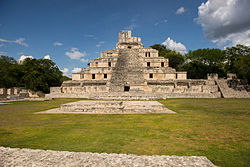Edzna
This article needs additional citations for verification. (December 2009) |
 | |
| Alternative name | House of the Itzaes |
|---|---|
| Location | Campeche, |
| Coordinates | 19°35′48.48″N 90°13′44.76″W / 19.5968000°N 90.2291000°W |
| History | |
| Material | Limestone |
| Abandoned | c. 1500 AD |
| Cultures | Maya |
| Site notes | |
| Discovered | 1907 |
| Excavation dates | 1958- |
| Public access | yes |
Edzná[pronunciation?] is a Maya archaeological site in the north of the Mexican state of Campeche. Today, the site is open to visitors.
The most remarkable building at the site is the main temple located at the plaza. Built on a platform 40 m high, it provides a wide overview of the surroundings. Another significant building located in the plaza is a ball court. Two parallel structures make up the ball court. The top rooms of the ball court were possibly used to store images of the gods associated with the events, along with items needed for the games.[1]
Edzná was already inhabited in 400 BC, and it was abandoned c. 1500 AD. During the time of occupation, a government was set up whose power was legitimized by the relationship between governors and the deities. In the Late Classic period Edzná was part of the Calakmul polity. Edzná may have been inhabited as early as 600 BC but it took until 200 AD before it developed into a major city. The word Edzná comes from "House of the Itzaes". The architectural style of this site shows signs of the Puuc style, even though it is far from the Puuc Hills sites. The decline and eventual abandonment of Edzná still remains a mystery today.
Edzná was discovered in 1907.[2] The first organised excavations started in 1958. In 1986, coordinating agencies began to employ Guatemalan refugees in the excavation, restoration and maintenance at Edzná. This project was funded by various international organizations.[3]


References
External links
 Edzna travel guide from Wikivoyage
Edzna travel guide from Wikivoyage- Edzná Photo Essay
- Edzná on AmazingTemples.com (en)



